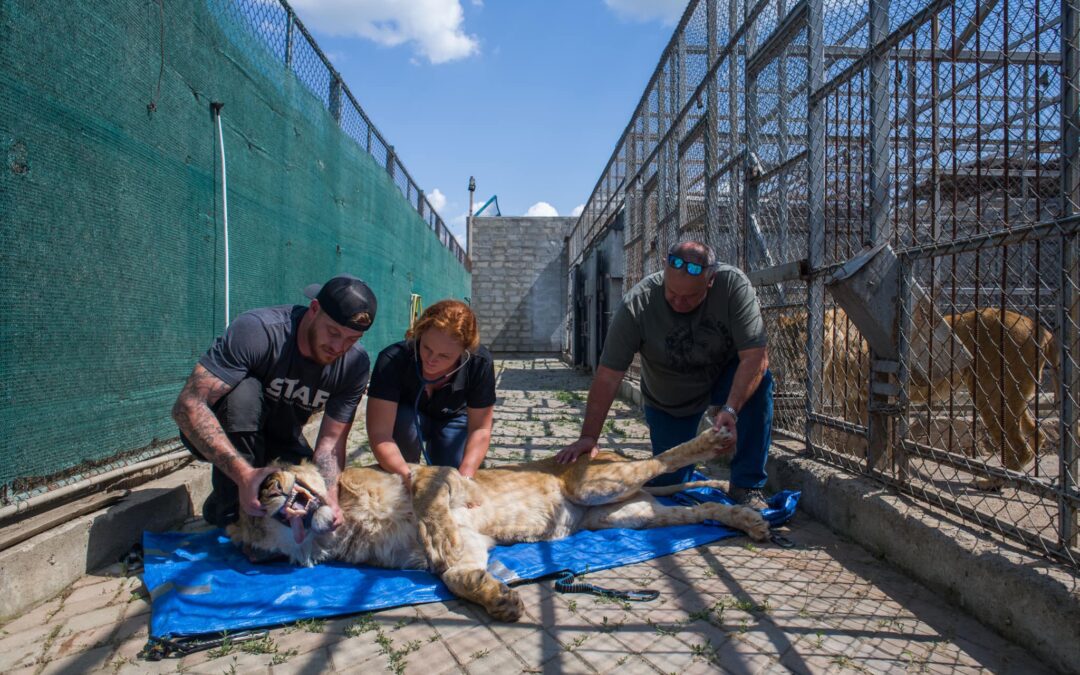The animals in question were stuck in Odesa, within the Biopark. The war has had a terrible impact on the whole country, with millions displaced. But this is the first time we’ve stopped to think about the animals left behind. The lions in question consist of seven adult lions and two small cubs.
This mission was a collaboration between Warriors of Wildlife, Worldwide Vets, and Breaking the Chains, who were actually present in Odessa. This is landmark rescue, given the nature of the conflict the animals were extracted out of.
For the lions in question, it was do or die given that they ran a very real risk of dying of starvation. Russian missiles could also wipe out the animal enclosures, or do enough damage that civilians would end up paying the price.
The mission has helped move the lions to Romania, where they will continue to stay safe and thrive before being moved to South Africa. Breaking the Chains has a British army veteran as its founder. He led the team of rescuers, which included members from Canada and the USA.
Warriors of Wildlife founder and South African Army veteran Lionel de Lange said: “It was an international operation, and it was great to work with other people who were keen on getting this amazing job done. I hope we can go back in under the Russian noses again and rescue more animals together in the future.“
“It’s great for me to get any animal out of a bad situation but I suppose for me as someone who has lived in Ukraine it was extra special. The lions’ future was super bleak staying in Odesa because the writing is on the wall and it looks like there’s not going to be an end to the war anytime soon,” he said.
Breaking the Chains founder, Tom has over two decades of experience as a man of the British Army. When he was medically discharged with PTSD, it was his dog that helped him find his footing.
“It was an animal that saved my life. I understand the true beauty and value of animals and I wanted to make sure I could save their lives which is why we are in Ukraine. My ground team are all veterans, so these are the guys who go into active conflict areas, and when I say active areas these are places under Russian offensive with troops on the ground. These are the conflict areas we operate in,” he said.
But the mission wasn’t as simple as just getting the animals out. “We’ve had bombs dropping pretty much at our feet numerous times whilst extracting animals in Ukraine, so we knew we could help in this mission,” Tom said.
Britain’s own Dr Gemma Campling, director of Worldwide Vets, spoke about the experience.
“This is the first time I’ve extracted carnivores from an active war zone. I have been in Ukraine for a couple of weeks looking at better ways to support horse and small animal work and this came up with quite short notice, but I’ve got a lot of wildlife experience and got drafted in,” she explained.
“Dealing with wildlife in a warzone is much more complicated than dealing with dogs and cats because obviously you can’t handle a lion. You have to be very accurate with the anaesthesia, or immobilisation, you have to be so accurate, and as the vet in charge of the procedure it becomes my job to keep everyone safe and keep the animals safe,” she said.
This isn’t the end for the team. Donations have been pouring in and they are expecting to return to find and help secure more animals out of the warzone. Ukraine continues to fight back against Russian aggression, just as our veterans continue to help push back too.


Really nice saving the animals.x Thank you veterans.x
Your bravery & care & commitment is absolutely incredible, thank you all from the bottom of my heart. Stay safe xxx
Excellent news. Good for you.
Such a caring person to take this on. Poor babies at least they are safe now. Lets hope it us all over soon. So much suffering